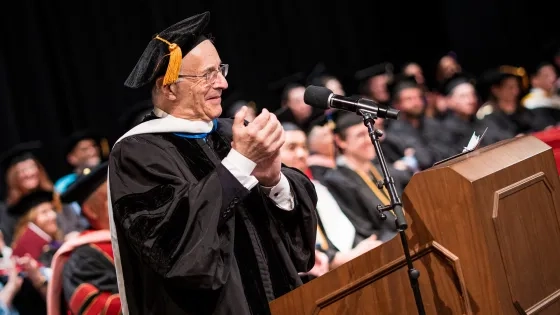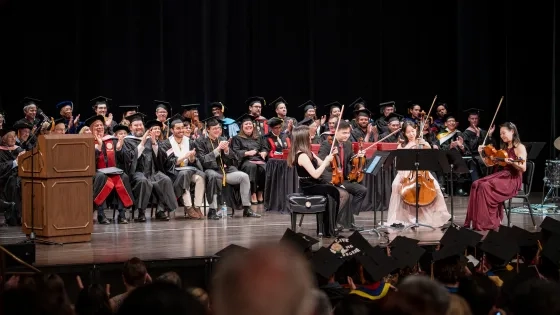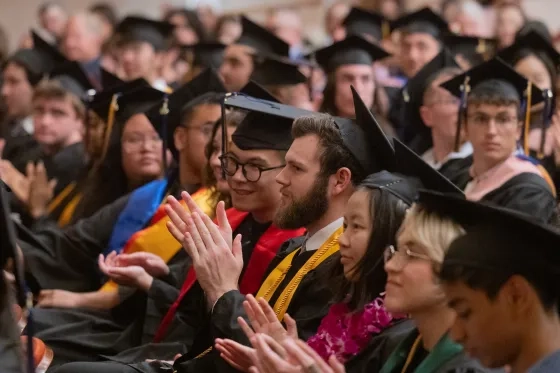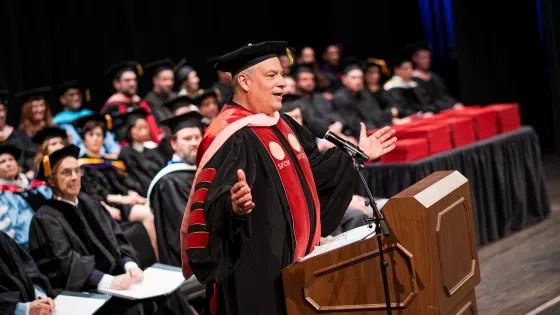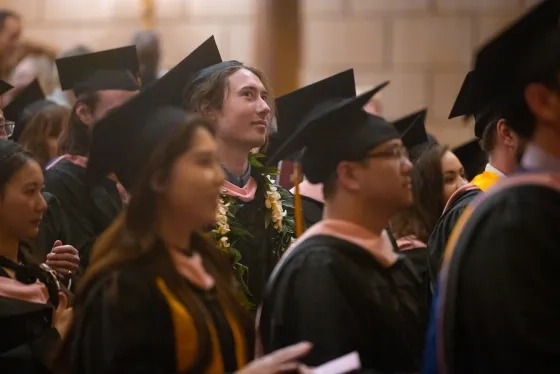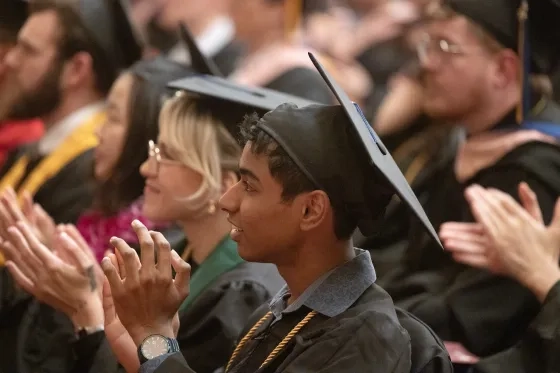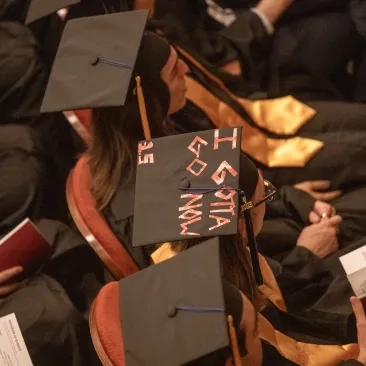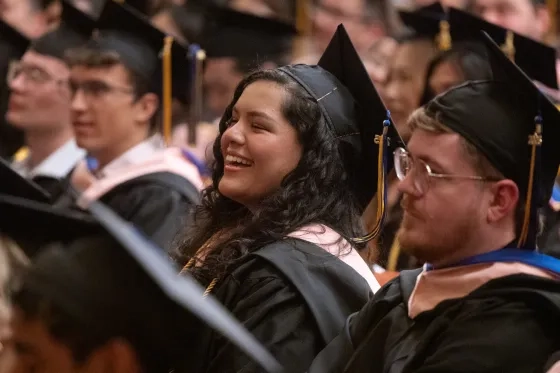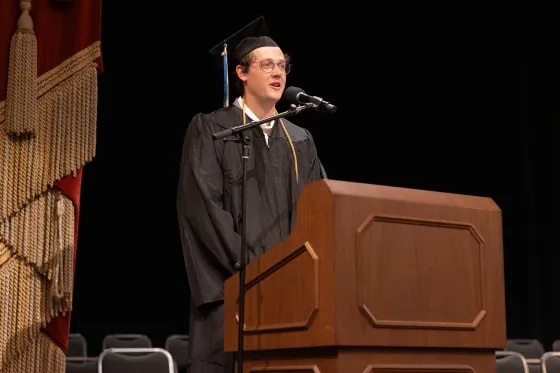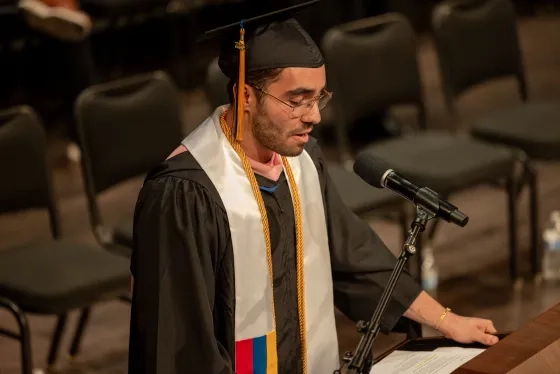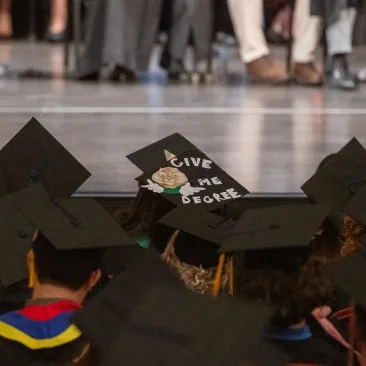'A Life in Music Is an Extraordinary Privilege:' SFCM Celebrates 2025 Commencement with Sir Clive Gillinson
SFCM leaders conferred 151 credentials to the class of 2025 and named Elinor Armer and Nikolaus Hohmann professors emeriti.
Diplomas in hand, musicians who have called SFCM home for years are stepping into the rhythm of an exciting and new unscripted symphony.
The San Francisco Conservatory of Music (SFCM) waved farewell to its 2025 class of musicians with its Friday commencement, conferring degrees to 151 undergraduate, postgraduate, and graduate students.
The ceremony, held at Herbst Theatre in the San Francisco War Memorial and Performing Arts Center, featured a welcome by Chairman of the Board of Trustees Timothy Foo, an address by Executive and Artistic Director of Carnegie Hall Sir Clive Gillinson (who also received an honorary degree from SFCM), remarks by SFCM President David H. Stull, student speeches, and numerous musical performances.
“This is a great honor for me, as I hold your Institution in the highest regard,” Gillinson said. “I’m also very honored to share this special day in the lives of all of you."
Executive and artistic director of Carnegie Hall since 2005, Gillinson is also known for his long tenure as managing director of the London Symphony Orchestra after joining the LSO as a cellist in 1970. Gillinson called the move from musician to manager, the “best mistake of my career,” adding that it’s important to keep an open mind as “talented people are multi-talented, and windows of opportunity are not always obvious.”
“A life in music is an extraordinary privilege,” Gillinson continued, “however, I would place a bet that few of you will end up exactly where you now think you’re going. That’s not a problem—that’s the adventure, and I hope you will all make at least one mistake as large as the one I made when I became a manager.”
SFCM President David Stull also addressed the class of 2025, telling students, "You can learn anything you want. Do anything you want, accomplish anything you want because that's what you've been practicing.”
Stull continued, “You'll be a musician for the rest of your life. Let me save you the suspense. We all are. You can't help it. You may do other things and make contributions and fall in love with other ideas and professions, but you're always welcome here."
Students selected Alan Jones (Roots, Jazz, and American Music, Bass) and Manuel Calderon (Technology and Applied Composition) as student speakers at Commencement. Graduating Technology and Applied Composition student Caroline Feitosa was awarded the 2025 Provost’s Award for Academic Achievement, while the President’s Award, given for academic achievement and leadership, was given to clarinetist Liam Cameron.
Dr. Nikolaus Hohmann, who along with Elinor Armer was named a professor emeritus at commencement, spoke to students as well. "One day, someone is going to walk into your concert hall and bring you a mind that is full of confusion," he said. "A heart that's overwhelmed, and a soul that is weary. Whether they leave with comfort and joy, depends on how well you do your art. So as you go forth and continue on your journey, remember, remember what music and beauty are capable of. So go out, inspire the people to come to your concerts, to hear you. Bring them joy, bring them comfort, bring them wonder, perhaps even healing, which will make you a blessing to this world and to the people whose lives you traverse. "
Read Sir Clive Gillinson’s entire remarks below:
"Good afternoon, President Stull.
Thank you for the great honor of inviting me to speak at this year’s commencement. It’s a privilege to be here with you all on such a meaningful day in your lives. I hold this institution in the highest regard, so it’s a great pleasure to share this moment with you.
Today, I’d like to speak about someone who had a profound influence on my life—Mstislav Rostropovich, or “Slava,” as he was known to all who knew and loved him.
He was not only a towering musical figure, he was also my closest friend on my musical journey. Although he’s no longer with us, his spirit and impact remain vivid for everyone who knew him, including my dear friend Sasha Barantschik, the brilliant concertmaster of the SF Symphony, who I believe is here today.
Are there any cellists in the graduating class? Slava would be delighted—he always said that cellists are family. Most of you already know that Slava was perhaps the greatest cellist who ever lived. But few people know that he was also a wonderful pianist, a remarkable conductor, and one of the most imaginative, passionate, courageous, loyal, and joyfully eccentric individuals I’ve ever met.
The stories I’ll share today reflect the core values that have shaped my own path—both as a musician and as the Executive and Artistic Director of CH.
My musical life began as a cellist with the London Symphony Orchestra, having joined shortly after graduating from the Royal Academy of Music. Twelve years into my time playing in the LSO, we moved into a new concert hall in the City of London.
However, our Managing Director at the time miscalculated our programming strategy, and we were quickly engulfed in a crisis: half-empty halls and devastating financial losses. When he refused to change course, the board had no choice but to let him go.
Because our financial position was so dire, no manager of the stature that we were seeking wanted the job. The board decided to appoint an LSO musician, temporarily, for three months, to give them more time to search for a real manager. I’ve absolutely no idea why they asked me, especially since there was one thing of which I was absolutely certain—that I never wanted to manage an orchestra!
My life changed overnight; one day I was a cellist in the LSO, and the next day I was running the orchestra—a terrifying experience initially. Like most musicians, I had always believed that management was very boring, and that it was largely about pushing paper. All of us musicians were convinced that we were the only artists. But I loved the LSO and I wanted to help. That 'temporary' appointment ended up being a 21-year fascinating and endlessly stimulating tenure, that ultimately led me to CH. So, what seemed like a crazy decision, became the best mistake of my life.
Soon after I took on the job, I heard rumors that Slava Rostropovich would be celebrating his 60th birthday with a massive project: performing 16 cello concertos, conducting the Britten War Requiem, the Prokofiev and Shostakovich 5th symphonies, and more—with two top London orchestras.
While I admired those ensembles, I felt this tribute should have the singular focus of being presented by one orchestra, if it was going to be the greatest possible tribute to Slava, which is what he deserved. When I called his manager, she explained that neither orchestra could afford to do it alone.
I asked if she believed it would be better artistically to consolidate it with one orchestra, and she agreed, but she said that both orchestras had been clear—the only viable way they could afford to do it was to share it.
In a crazy moment of blind faith, I told her the LSO would take on the entire project, even though we were in a dire financial position. Needless to say, I had no idea how we’d fund it, I just knew it was the right way to do this.
When she told Slava what this 'lunatic' at the LSO had said, his response was, 'If he believes in me like that, I believe in him. And what’s more, if he’s a cellist—that settles it.'
We miraculously secured sponsorship and produced one of the greatest artistic successes in our history. Instead of being our downfall, it became a catalyst for renewal—and a powerful early lesson for me in leadership: that money follows vision, a principle that remains at the heart of our work at CH. After agreeing to do the project with us, Slava invited me to meet with him at CH, after one of his concerts there. He was performing a massive program, in which he played a cello concerto in the first half and conducted a Shostakovich symphony in the second. Following the concert, he greeted every guest backstage with his usual ebullience—three kisses for each person, at a minimum. By the time the crowd had dispersed, it was nearly midnight.
I offered to meet with him the next morning, as I assumed he must be too exhausted to talk. His response was—'No. Now we work!' We sat down and planned the entire festival in under 90 minutes, thanks to his laser-sharp focus. When we had finished, I offered to walk him back to his hotel. 'No, no, no' he said, 'now I practice the cello.' I left CH to the heavenly sound of Slava practicing—just him and a lone security guard the only two people left in the entire building. That moment taught me what true dedication looks like. Great artists are never satisfied.
'Everything we do, matters.' Two Slava stories illustrate this beautifully:
After a concert, a woman came to see him and asked him what his favorite piece of music was. His answer was simple: 'The piece I’m playing now—or I shouldn’t be playing it.' That, I believe, is a perfect philosophy for life.
The second story took place after he offered refuge to the great Soviet writer Alexander Solzhenitsyn, an act that earned him the wrath of the Soviet regime—and that ended all his concert engagements in the USSR.
Then, one day, out of the blue, he was invited to perform a concert in Siberia, in a massive aircraft hangar with several thousand seats. But when he arrived, he found that the promoter had failed to publicize the event. No audience. Concert cancelled. However, when he learned that eight former political prisoners had trudged across the Siberian snow for days just to be there, he refused to cancel. He played the entire program for those eight people, ending with every encore. They gave him a standing ovation—eight people in a sea of empty chairs. That was Slava: art, heart, and integrity—no matter the size of the crowd.
Humility: I’m frequently asked what I think is the most important quality in every great artist, and I am certain it’s humility.
Greatness in music comes from reverence for the art, not from self-regard. Slava was asked repeatedly by his record label to record the Bach solo cello suites. Finally, in his 60s, he agreed, but only on his own terms. After an extensive search, he found a church in France, with the ambience and acoustics that he was seeking. He hired the crew and paid all expenses himself, so that if he wasn’t satisfied, he could destroy the recording. After days of painstaking playing and editing, he finally approved the recording. The result was a best-selling, deeply personal interpretation. His only motive was to serve Bach, not fame, not commerce, just the music. That humility is what makes greatness.
Perhaps I should note that humility in music doesn’t always extend to every area of life, but that’s a conversation for another time!
Humor and humanity: Slava’s joy in life was contagious.
When I was the LSO’s Managing Director, the orchestra threw me a surprise birthday party. As I walked in, there were my colleagues, staff, and family. Suddenly, the door burst open and in leapt a gorilla. It swung from the doorway, grabbed the birthday cake, and started to gobble it off the floor. Then someone handed a cello to the gorilla, 'to remind you of your former life as a cellist Clive.' The gorilla made a complete mess of it, and didn’t even know in which hand to hold the bow. I was then asked to 'help the gorilla to at least hold the cello and the bow properly.'
I stepped forward to take on this ridiculous task … at which point the gorilla played 'Happy Birthday' superbly. It was Slava.
Before I close, I have a few words to say about the future.
There’s an absurd amount of hand wringing about whether classical music remains 'relevant.' That question, frankly, is meaningless to me. The greatest works of music, like the greatest works of literature and art, are not just of their time—they are timeless. They belong to every generation, every culture. They express universal truths, and those truths will endure whilst human beings endure. Every great artist I’ve ever known builds tomorrow from the foundation of yesterday. Institutions falter when they believe their job is to discard the past and impose their own egos on the future.
Leonard Bernstein, one of the greatest artists I ever knew, understood this deeply. Late in his life, he bought a new set of scores for the Tchaikovsky symphonies, works he had performed countless times before, to enable himself to study them afresh. That tireless search for meaning is the soul of a musical life, whether on stage or behind the scenes.
To all of you beginning your journey today, I offer this: whatever path you think you’re on, be open to detours. Becoming a manager was the last thing I ever imagined doing or ever wanted to do, and yet it became the best mistake of my career. One wise teacher once told me: 'Talented people are multi-talented. Stay open to ideas, probable and improbable, or you may not even see unexpected windows of opportunity when they appear.'
A life in music is an extraordinary privilege. However, I would place a bet that few of you will end up exactly where you now think you’re going. That’s not a problem—that’s the adventure, and I hope you will all make at least one mistake as large as the one I made when I became a manager.
Congratulations. I wish you a life filled with purpose, discovery, inspiration, and most importantly, the joy of music. Thank you.'
